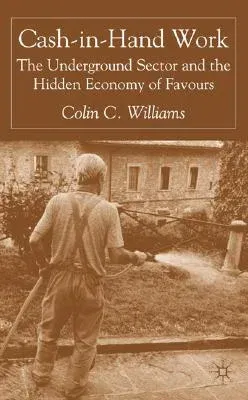C Williams
(Author)Cash-In-Hand Work: The Underground Sector and the Hidden Economy of Favours (2004)Hardcover - 2004, 3 July 2004

Qty
1
Turbo
Ships in 2 - 3 days
In Stock
Free Delivery
Cash on Delivery
15 Days
Free Returns
Secure Checkout

Print Length
237 pages
Language
English
Publisher
Palgrave MacMillan
Date Published
3 Jul 2004
ISBN-10
1403921725
ISBN-13
9781403921727
Description
Product Details
Author:
Book Edition:
2004
Book Format:
Hardcover
Country of Origin:
US
Date Published:
3 July 2004
Dimensions:
22.35 x
14.48 x
1.91 cm
ISBN-10:
1403921725
ISBN-13:
9781403921727
Language:
English
Location:
London
Pages:
237
Publisher:
Weight:
435.45 gm